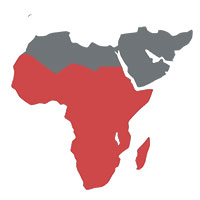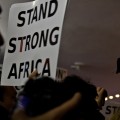Development, what of it?
Julian K | December 7, 2011.
The term ‘development’ is one that everybody uses yet, nobody understands. It splits the world in half, differentiating between ‘developed’ and ‘developing’ countries, and broadly defines discourse on international politics, not only at the UN climate change negotiations here in Durban. The terms ‘developing’ and ‘developed’ simplify a highly complex issue, they stigmatise. Simply, they are terrible.
The problems associated with the idea of ‘development’ are plentiful.
The word ‘developing’ implies, by default, that there are ‘developed’ countries. Is that to propose that the US and most of the European countries have reached perfection? Considering social injustice, financial problems, in addition to internal and external struggles, this is not feasible.
Furthermore “there is no established convention for the designation of ‘developed’ and ‘developing’ countries,”1 as the UN has conceded.
To avoid extensive debate on this issue in crucial negotiations on the Kyoto Protocol, Annex I refers to ‘developed countries’. Like a bouncer, it defines who gets to join the club and who doesn’t. Based on this distinction, the debate can unproblematically cover ‘developed’ and ‘developing’ countries, without having to engage in a real debate on what ‘development’ is.
In Durban, however, the terms developed and developing countries are being challenged by the reemergence of two words: the terms ‘Global North’ and ‘Global South’ are trying to fight their ways back onto the global stage.
This is a step backwards.
Geographically speaking, it is just wrong. Australia and New Zealand are as far south as the world extends, yet they are considered ‘Global North’.
It doesn’t provide further an answer to the question of ’what is development?’. Are countries of the former Eastern Bloc North or South? Is Albania, with a GDP per capita of about $3600, part of the ‘Global North’, while Namibia and Mauritius with higher GDPs are not? Is Cuba, beating Russia, Serbia and Montenegro in the Human Development Index, part of the North? What about oil rich states like Angola or Saudi Arabia? What about Chile?
If anything it is harder to specify the distinctions between countries using the North-South divide than the differences between ‘developed’ and ‘developing’.
Furthermore, there is no ‘in-between’, it is black and white. Nobody would ever talk about the ‘global north-east’ or the ‘global south-south-west’
Of course, ‘developing’ and ‘developed’ are just as black and white, but at least these terms allow a transition. ‘South’ and ‘North’ do not. The line drawn between the ‘Global North’ and the ‘Global South’ is an insurmountable barrier. Countries of the ‘Global South’ cannot break off their continents and join the North. The same applies to states from the ‘Global North’ who cannot simply slip south, when recessions lower their GDP.
The beauty of the terms ‘developing’ and ‘developed’ is that they break down these barriers and eradicate the strict separation. When President Truman coined the term ‘development’ in his 1949 inaugural address, he – inadvertently – created a new understanding of the world order. The countries concerned were suddenly not, as they had been called in the period of colonialism, ‘barbaric’ and ‘uncivilised’ anymore opposed to European and North American ‘civilised’ countries. “The old imperialism […] has no place in our plans. What we envisage is a program of development,” Truman declared. The former ‘barbaric’ countries had become countries like any other on the planet, no matter if in the North or in the South. They found themselves simply on another end of the scale. Being on the same scale meant in turn that the way for joining the ‘developed’ countries technically was open. The wall between ‘barbaric’ and ‘civilised’ had been teared down.
The recent recurring of the idea of ‘global north’ and ‘global south’ here in Durban builds the wall again. It opens an unclosable gap.
I therefore invite the participants at this climate change conference to reflect of the progress made by Truman more than sixty years ago. The terms ‘developing’ and ‘developed’ are far from perfect, but as long as inequalities between different countries exist, let us, at least in terms of our language, leave the door open for countries to join the ‘developed’ world.













comment